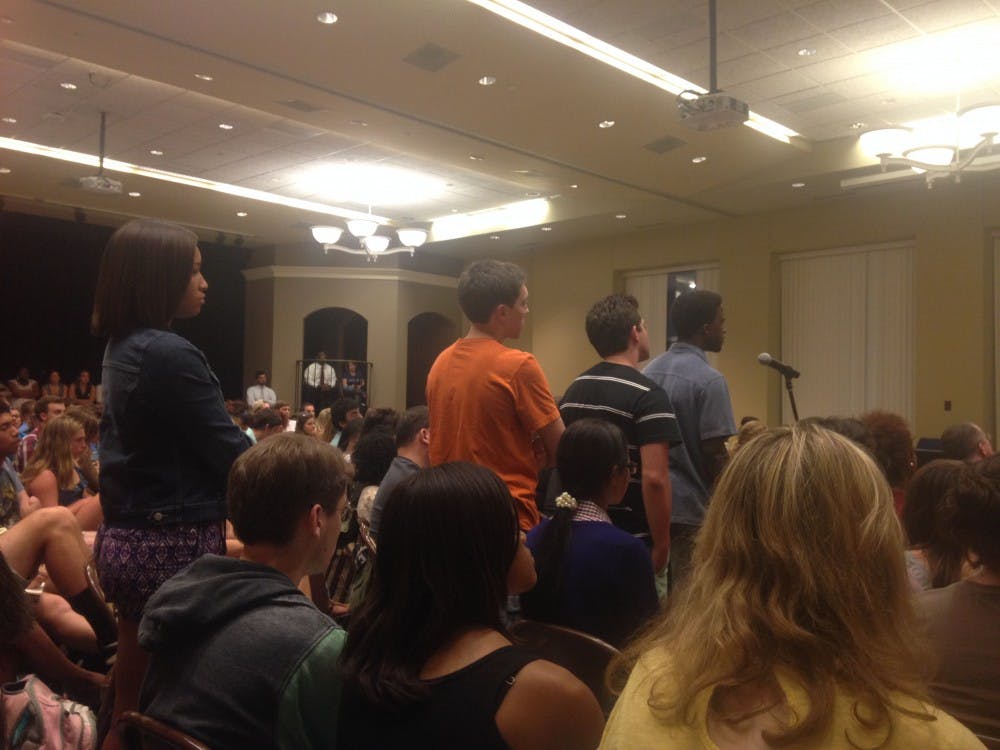"It just feels as if it's a bad dream for everyone."
Elon student and Ferguson resident Mia Ginae Watkins remembers pacing around the house while watching news updates in disbelief with her family on August 9, when an unarmed 18-year-old African-American male named Michael Brown was fatally shot by a white police officer in Ferguson, Mo.
"Behind my backyard is the main street where the riots took place," said Watkins, a third-year student. "My heart breaks for seeing my neighborhood being torn to pieces." [youtube http://www.youtube.com/watch?v=SoYqAePKk-o?list=UUaKWsFcrO1yoE5qHmYq419g]
More than 300 members of the Elon community squeezed into a full McKinnon Hall Thursday night when Watkins joined Randy Williams, Dean of Multicultural Affairs, Jason Husser, Faculty Fellow for Civic Engagement, Joe Incorvia, Student Government Association (SGA) President, and a full panel for a Q&A event titled "Lessons Within Ferguson, MO."
"I just needed someone to talk to, and then, it just sort of spread and everyone wanted to talk about it which I wasn't sure about at first but I did realize that me being the position that I am, from Ferguson, I had the opportunity to say what I felt and to be an agent of change in the Elon community," Watkins said.
The event was co-sponsored by the Multicultural Center and the university's Council on Civic Engagement to encourage dialogue in an educational space about the events in Ferguson and the impact on Elon's campus.
"No group should have to carry those issues alone...they are human problems, problems we must all tackle together," said Husser in his opening remarks.
Students did not hesitate in approaching the five panelists: Jim Bissett, Professor of History, Ken Fernandez, Assistant Professor of Political Science and Policy Studies, India Johnson, Assistant Professor of Psychology, Robert Parrish, Assistant Professor of Law, Sandra Reid, Lecturer in Human Services Studies and their moderator Naeemah Clark, Associate Professor of Communications. [youtube http://www.youtube.com/watch?v=uxQEvYu-FN4?list=UUaKWsFcrO1yoE5qHmYq419g]
Some students had specific questions such as the effectiveness of riots on social change. Others chose to share personal anecdotes about the lack of discussion they found surrounding the issue, hoping to receive advice for how to create a safe space to talk about this and future sensitive conversations with friends and family.
All of the panelist agreed that there was no easy solution and often, no easy answer to many of the questions.
"For social change to happen, we have to force the people who are standing in our way to change...social change is very very difficult to bring about," Bissett said.
Students also questioned the likelihood of a similar incident happening in communities such as Elon. Earlier in the week, members of the Sigma Delta chapter of Alpha Phi Alpha Fraternity, Inc. organized a 'Hands Up, Don't Shoot' photograph that brought together roughly 200 Elon students, faculty and other community members.
Multiple panelist shared the opinion that the events in Ferguson were not exclusive and could've happened in many other locations across America, even here at Elon. Director of Elon Campus Safety and Police, Dennis Franks, chimed in stating, "the police are here to serve" if something like this ever happens near campus.
But it is not just the police who play pivotal roles in these situations.
"You don't have to believe a stereotype for it to influence your judgement...you are biased and these types of judgements matter," Johnson said.
When personally defining what each panelist would consider a victory for Ferguson, none of the panelist believed the police officer who shot Brown will go to jai, but all panelists believed a policy change was in order.
"You young folk have got to take the reins," Reid said. "We have to somehow get the courage to take that risk and to ask the question...we can give people hope."
Watkins had her own ideas on how to approach the future.
"It woke me up, that I can't really escape from whats happening right now in America, that there's, something is changing, that there's a movement going on and that we're all part of it, and I had to realize that I'm a part of it as well," Watkins said.


